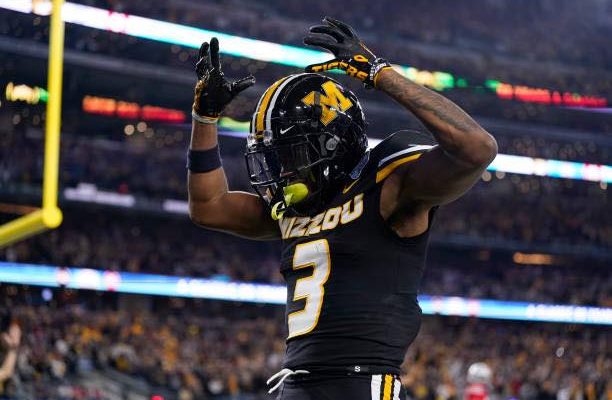The recent agreement between the Chicago Bears and their second-round pick, wide receiver Luther Burden III, on a fully-guaranteed $10.965 million contract, marks an extraordinary moment in NFL history. This isn’t just another rookie signing; it’s a seismic shift in the league’s financial landscape, particularly for non-first-round draft picks. For the first time ever, the 39th overall selection has secured a deal where every penny is guaranteed, a monumental departure from traditional rookie contract structures. This groundbreaking deal has sent ripples through the NFL, prompting a closer examination of the collective bargaining agreement (CBA), team financial strategies, and the burgeoning power of rookie talent and their agents.
To truly understand the magnitude of this development, we must first delve into the historical context of NFL rookie contracts. Before the 2011 Collective Bargaining Agreement, rookie deals were often a wild west of negotiations, particularly for top picks. Quarterbacks, in particular, could command exorbitant contracts with massive signing bonuses and substantial guaranteed money, often before even stepping foot on an NFL field. Sam Bradford, for instance, signed a $78 million deal in 2010, the last year before the new rookie wage scale was implemented. These deals, while lucrative for the players, often led to lengthy holdouts, as rookies and their agents battled teams over every last dollar and clause. From the team’s perspective, it was a high-risk, high-reward scenario, with significant capital tied up in unproven talent. The perceived inefficiency and disruption caused by these prolonged negotiations ultimately led to a desire for a more structured and predictable system.
The 2011 CBA dramatically reshaped the rookie contract landscape. The core principle was to establish a rookie wage scale, effectively pre-determining the value of contracts for each draft slot. This was a win for the owners, who sought to control costs and eliminate holdouts, ensuring rookies were in camp on time. For players, especially those outside the top few picks, it meant less negotiation leverage but also a guarantee of a minimum salary based on their draft position. First-round picks saw their contracts become fully guaranteed as a standard, reflecting their higher perceived value and the significant investment teams made in them. However, for second-round picks and beyond, the guarantees typically diminished considerably. While a portion of the signing bonus was usually guaranteed, the base salaries in later years often remained non-guaranteed, meaning a player could be cut without receiving the full value of their contract if their performance didn’t meet expectations or if they suffered an injury. This system, while streamlining the process, created a clear delineation in financial security between first-rounders and the rest of the draft class.
For over a decade, this system largely held firm. Second-round picks would receive four-year contracts, with a significant signing bonus that provided some upfront security. However, the subsequent years of their base salary were often subject to performance clauses, roster bonuses, and injury waivers, meaning the “guaranteed” money was rarely the full contract value. Teams held the leverage, able to cut a player and mitigate their financial exposure if the player didn’t pan out. This financial safety net for teams was a key component of the rookie wage scale, allowing them to take more calculated risks in the draft without incurring massive dead cap penalties for unfulfilled potential.
Now, enter Luther Burden III and the Chicago Bears. The report from @WINSportsGroup, confirming his fully-guaranteed $10.965 million contract, represents a watershed moment. It signifies that the traditional norms of rookie contracts, particularly for second-rounders, are being challenged and, in this instance, outright broken. This isn’t just about a few extra dollars; it’s about shifting the risk from the player to the team. With a fully guaranteed deal, Burden III is assured of receiving the entirety of his $10.965 million, regardless of injuries (unless self-inflicted and contractually defined as such) or performance issues. This fundamentally alters the dynamic, providing unprecedented financial security to a player who, just a few months ago, was still navigating the amateur landscape of college football.
The implications of this deal are far-reaching and multifaceted. Firstly, it immediately impacts the Chicago Bears. While they’ve secured a highly touted talent in Burden III, they’ve also committed a substantial amount of guaranteed money to a player who has yet to play a snap in the NFL. This commitment affects their salary cap management, potentially limiting their flexibility in future free agency periods or in signing extensions for other key players. Every dollar guaranteed to Burden III is a dollar that cannot be reallocated if his performance doesn’t meet expectations. This places a higher onus on the Bears’ scouting department and coaching staff to ensure Burden III not only lives up to his potential but thrives, justifying the significant financial outlay. It transforms the investment from a performance-based risk into a definitive financial obligation.
Speaking of Luther Burden III himself, his profile as a player offers some insight into why the Bears might have been willing to make such a bold move. A standout wide receiver from the University of Missouri, Burden III entered the draft with considerable fanfare. He’s known for his dynamic playmaking ability, elite quickness, and impressive yards-after-catch potential. His college statistics showcase his versatility and explosiveness, making him an intriguing prospect for any offense. While his 2024 season saw a slight dip in production compared to his stellar 2023 campaign, his overall talent and potential were still highly regarded. Scouts often highlighted his ability to be a game-changer with the ball in his hands, whether as a receiver or a return specialist. This kind of elite talent, even outside the first round, often commands a premium, and the Bears clearly saw something in Burden III that warranted this unprecedented level of financial commitment. It’s a testament to his perceived talent and the Bears’ belief that he will be an integral part of their offensive future.
However, the ripple effect extends far beyond just the Bears and Burden III. This deal sets a powerful precedent for future second-round picks and their agents. The traditional notion that only first-rounders receive fully guaranteed contracts has been shattered. Agents for other highly-touted prospects in the second round will undoubtedly point to Burden III’s contract as a new benchmark. This could lead to more protracted negotiations in upcoming drafts, with players holding out for similar guaranteed money. We’ve already seen signs of this shift. Prior to Burden’s deal, reports indicated a significant holdout among 2025 second-round picks, with many refusing to sign traditional deals. Carson Schwesinger (No. 33, Cleveland Browns) and Jayden Higgins (No. 34, Houston Texans) reportedly secured similar fully guaranteed deals just days before Burden, suggesting a collective movement to redefine rookie contract norms for this draft class. Alfred Collins (No. 43, San Francisco 49ers) also reportedly secured a deal with over $9 million guaranteed, further solidifying this trend. This signals a united front from players and agents, leveraging their collective power to demand more financial security. The NFL Players Association (NFLPA) will undoubtedly view this as a significant victory, as it pushes the boundaries of guaranteed money further down the draft board.
The implications for NFL draft strategy are also significant. Teams might have to reconsider how they value and select players in the second round. If fully guaranteed contracts become the norm for early second-round picks, the financial risk associated with those selections will increase dramatically. This could lead to teams being more conservative with their early second-round selections, perhaps prioritizing players with a higher floor or more certainty in their development. It might also encourage teams to trade back in the second round to mitigate financial risk, or conversely, to trade up aggressively for a player they are absolutely convinced will be a star, knowing the financial commitment is now much higher. The balance between talent acquisition and financial prudence will become even more delicate.
Furthermore, this development raises questions about the long-term future of the rookie wage scale established in the 2011 CBA. While the current agreement provides a structured framework, the ability of players and agents to negotiate fully guaranteed deals outside the first round indicates a potential crack in that foundation. As the league continues to generate immense revenue, players and their representatives will naturally push for a larger share of that pie and greater financial security. This could be a precursor to more significant changes in future CBAs, with the NFLPA potentially seeking to expand guaranteed contracts further down the draft board, or even for veteran players.
The historical reluctance of NFL teams to offer fully guaranteed contracts stems from several factors. The brutal, high-impact nature of the sport means that injuries are a constant threat, and a player’s career can be derailed in an instant. Teams have traditionally protected themselves against paying players who are unable to perform due to injury or who simply don’t develop as expected. The “funding rule,” an archaic league rule that required teams to place into escrow an amount of money equal to what they were guaranteeing a player beyond the first year of a contract, also played a role. While less of a direct constraint today, the philosophy behind it – that guaranteed money ties up capital – has persisted. However, as other major sports leagues like the NBA and MLB routinely offer fully guaranteed contracts, the NFL’s position has increasingly come under scrutiny from players and their union. The Kirk Cousins precedent, where he secured the first fully guaranteed multi-year deal for a quarterback in NFL history, was a significant crack in the dam for veteran players. Burden’s deal represents a similar breakthrough for rookies outside the first round.
In essence, Luther Burden III’s fully guaranteed contract is more than just a lucrative deal for a talented young player. It’s a testament to the evolving power dynamics within the NFL. It highlights the growing influence of player agents, the increasing willingness of teams to take calculated financial risks for elite talent, and the ongoing push by the NFLPA to secure greater financial security for its members. As training camps approach and the rest of the 2025 rookie class finalizes their deals, the spotlight will remain on the negotiations, with every signed contract now evaluated against the groundbreaking precedent set by Luther Burden III and the Chicago Bears. This is not merely a transaction; it is a turning point, and the full ramifications of this new era of rookie contracts will undoubtedly shape the NFL for years to come, influencing everything from draft strategy to future collective bargaining negotiations. The Age of the Fully Guaranteed Second-Round Pick has dawned, and the league will certainly never be the same.



